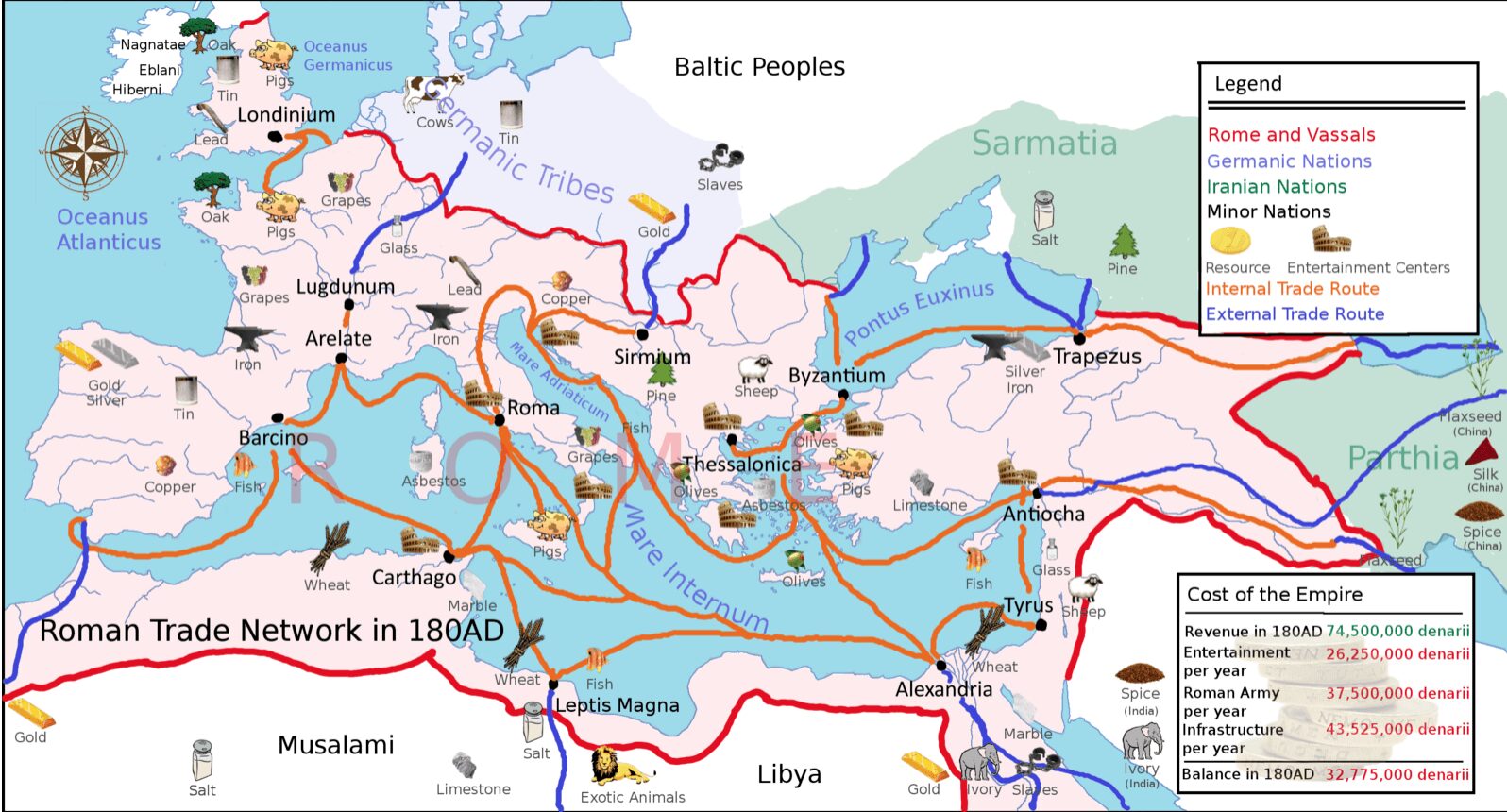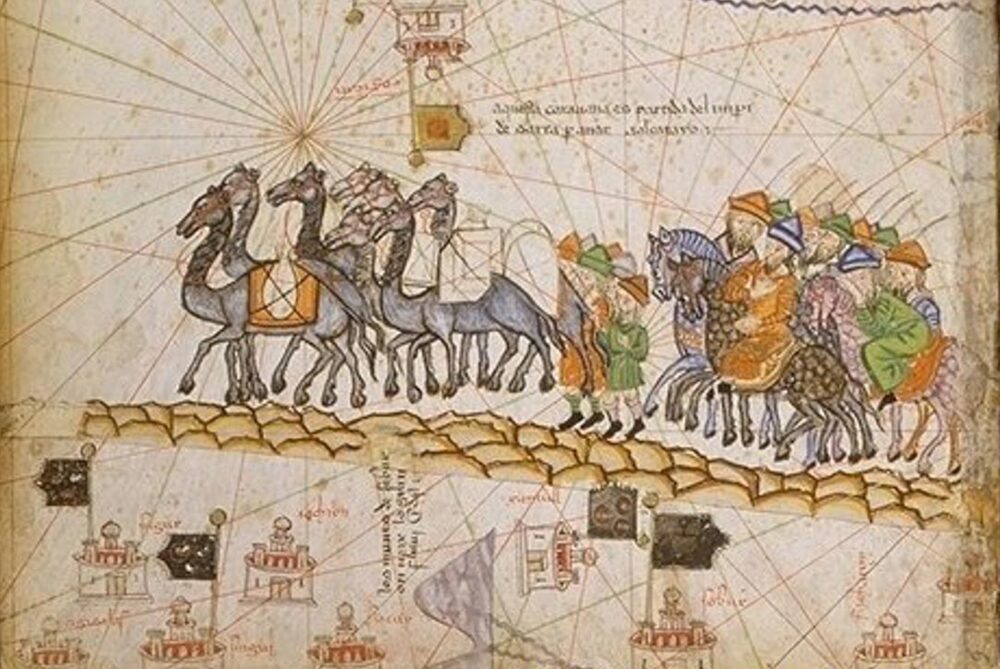Trade was a powerful engine behind the Roman Empire’s growth, shaping its economic and cultural landscapes. The Romans masterfully developed infrastructure like extensive road networks and harnessed the Mediterranean Sea, enabling them to connect distant regions and facilitate the movement of goods. These achievements made trade central to the Roman economy, influencing the prosperity enjoyed by its citizens. During the Pax Romana, a time of relative peace and stability, these conditions supported robust trade activity.
The Roman economy was marked by diverse imports and exports. The Empire saw a wide circulation of commodities like pottery, glass, wine, and olive oil, each traveling from regions known for their production. Rome relied heavily on resources spread across its provinces, from the metal-rich areas of Spain and Britain to the grain-producing lands of Egypt. Despite these strengths, the trade system also faced challenges. Wealth wasn’t evenly distributed, leading to social divides, while taxes levied on trade to support public works and the military added strain to the system. Additionally, piracy and regional instabilities occasionally threatened this intricate web of commerce.
Key Takeaways
- Trade was essential for the Roman Empire’s growth and cultural exchange.
- Road networks and the Mediterranean Sea were vital in connecting regions.
- The trade system faced challenges like taxes and piracy.
The Role of Trade in the Roman Empire
Roads and Seaways as Trade Enablers
Roman engineers excelled in building roads that were not only straight and durable but also widespread, aiding the Empire’s economic progress. These roads reached from Britain’s cold northern frontiers to Egypt’s deserts, and from the rocky landscapes of Spain to ancient Persia. Initially designed for military use, they soon became vital for trade, allowing goods to move easily across the expansive Empire. Additionally, the Mediterranean Sea, important for Roman identity, was crucial for trade. Referred to as “our sea” by the Romans, they used their strong navy and well-located seaports to make sea routes efficient, which was less costly than land routes. This major waterway also facilitated cultural and economic exchanges across the Empire.
Growth in Economy and Cultural Exchange
Trade was an essential part of the Roman economy, driving wealth and cultural interaction. A diverse range of goods moved throughout the Empire, including fine pottery and glass from the east, wine from Gaul and Italy, and olive oil from Spain and North Africa. Spain provided valuable metals like silver, while Britain was known for tin and iron. Additionally, fertile regions like Egypt and North Africa supplied vast amounts of grain to feed Rome’s large population. This flourishing trade network not only transported goods but also spread ideas, philosophies, and cultural practices, helping to unify the varied cultures within the Empire.
Peace and Stability Under Pax Romana
The reigns of Augustus to Marcus Aurelius marked a period of peace known as the Pax Romana, which significantly boosted trade activities. During this time, trade thrived due to reduced military actions and stable internal conditions. Traders and merchants carried out their businesses with reasonable safety, as there were fewer risks from warfare or invasions. This era provided a favorable environment for commercial growth, supported by a standardized legal system and a common currency, which further encouraged economic development.
The Foundations of Roman Economy
Trade Paths and Goods
The Roman Empire’s economic success owed much to its efficient trade routes. Enabled by advanced roads and strategic use of the Mediterranean Sea, these routes connected distant lands. The Romans built durable roads stretching from Britain to Egypt, and from Spain to Persia. These roads were initially for military, but also boosted trade. Moreover, the vast sea, known as mare nostrum, allowed for cheap and bulk transport, improving economic integration and cultural exchange.
Foreign Products and Local Expertise
The Empire imported diverse goods while regions specialized in specific products. Fine pottery and glass from the East were popular for their beauty. Gaul and Italy were renowned for wine production, and Spanish provinces supplied essential olive oil. Spain also provided silver, Britain offered tin and iron, while Egypt and North Africa were the hubs for grain. These regions, with their specialized outputs, supported the Empire’s needs and connected various cultures within.
Impact of Enslavement on Economy
Enslavement played a vital, though grim, role in Rome’s economy. Individuals from different empires, often prisoners of war or victims of poverty, ended up as enslaved workers in Rome. They were used across various sectors, contributing significantly to the economic productivity of the Empire. Despite the reliance on enslaved labor, this system also reflected stark social inequalities across the Roman society.

Difficulties in the Roman Trade Network
Imbalances in Wealth and Social Divide
The Roman Empire experienced notable differences in wealth distribution that led to social issues. Many people, particularly those living in the rural areas, survived on just the basics. These individuals didn’t benefit from the wealth that trade brought to the Empire. This gap contributed to a widening split between the rich and the poor, creating tensions and dissatisfaction among the lower classes.
Revenue and Resentment from Taxes
Taxes played a crucial role in funding the Empire’s activities, like maintaining roads and supporting the military. These taxes were often levied on trade goods. While necessary for state functions, they were a heavy burden on traders and merchants, stirring feelings of resentment. There was always a risk of corruption among tax collectors, further complicating the issues related to taxes.
Piracy Threats and Supply Dependence
Piracy posed a continuous threat in the trade routes of the Mediterranean. Despite efforts by the Roman navy to keep routes safe, pirates could still cause disruptions and significant losses. Additionally, the Empire’s reliance on goods like grain from regions such as Egypt and North Africa made it vulnerable. Changes in these areas—due to weather, political issues, or conflicts—could interrupt supplies, leading to shortages and unrest in Rome.
The Roman Empire’s Taxation System
Agents and Tax Duties
In the Roman Empire, tax collection was overseen by officials known as procurators. These were important individuals appointed to manage financial matters within a province. They assessed and collected taxes, ensuring the funds were forwarded to Rome. Procurators and tax collectors often engaged in a bidding process to secure contracts for tax collection. Once they secured a contract, they paid an upfront sum to the state and then collected taxes locally to recoup their investment and make a profit.

Various Forms of Taxation
The Roman Empire implemented several types of taxes to maintain its economy:
Land Tax (Tributum Soli): This tax was applied to provinces with fertile lands like Egypt and North Africa, leveraging agricultural revenue.
Poll Tax (Tributum Capitis): Levied on individuals based on their ability to pay, this tax was a flat rate in some provinces and did not vary with income.
Customs Duties (Portoria): Taxes placed on goods entering cities, particularly notable in Rome.
Additionally, newly conquered territories were often required to pay tribute. This could include cash, provisions, or even manpower for military service.
| Tax Type | Description |
|---|---|
| Land Tax | Applied to agricultural revenue in fertile regions |
| Poll Tax | Individual tax often at a flat rate |
| Customs Duties | Taxes on goods entering cities |
| Tribute | Payments or provisions from conquered territories |
Effects of Taxes on Society and the Military
Taxes played a crucial role in funding the Roman military, covering salaries, equipment, and other campaign expenses. Moreover, they supported social programs such as the grain dole, which was essential in providing free or discounted grain to the citizens of Rome. While taxes were integral for state functions, they could be a heavy burden on traders and merchants, sometimes causing resentment. This system, along with potential corruption among collectors, could create tension within the provinces.
